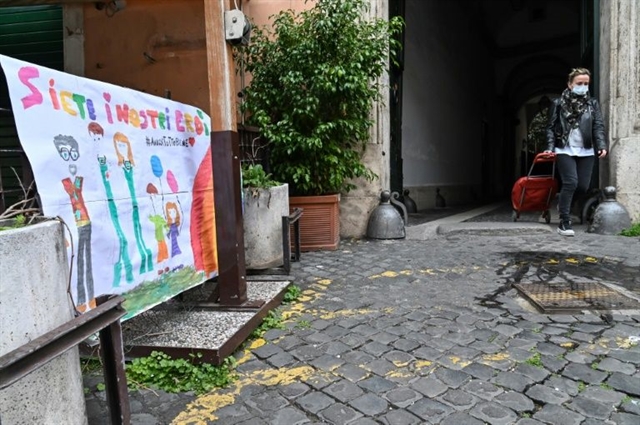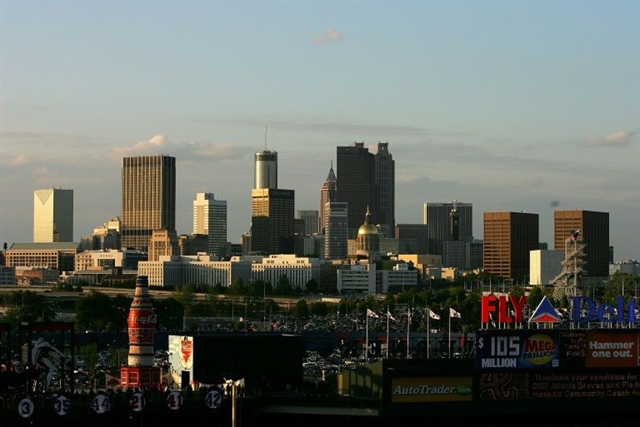 World
World


|
| A home-made poster thanks nurses and doctors for their work calling them "heroes". — AFP/VNA Photo |
ROME — Italians were spending their first weekend under lockdown Saturday, with only the odd jogger or dog-walker visible on pavements otherwise emptied in an attempt to contain Europe's worst coronavirus outbreak.
On Saturday evening authorities said 3,497 cases had been recorded in the past 24 hours, bringing the total to 21,157.
The death toll now stands at 1,441, up from 1,266 on Friday.
Since Monday the country has enacted a set of sweeping measures which have left millions virtually confined to their homes and shut down large parts of the economy.
However, Prime Minister Giuseppe Conte insisted on Saturday that "Italy is not stopping" after a marathon all-night meeting with unions and businesses where security procedures were agreed to protect those Italians still going to work.
Italian media report that the government is expected this weekend to announce details of further measures to soften the shock to the economy, including moratoriums on loan payments, extending tax deadlines and making sure self-isolation is covered under sick leave.
The spate of measures curbing almost every aspect of daily life has nonetheless continued.
World-famous car maker Ferrari has announced that it would suspend production for two weeks at two factories in northern Italy due to supply chain problems.
City authorities in Milan and Rome decided as of Saturday to shut enclosed parks and gardens to prevent people gathering at close quarters.
However, larger open spaces such as Rome's 80-hectare Villa Borghese will remain open as long as visitors remain a metre apart, as physical exercise is one of reasons for movement deemed "essential" under the new rules.
Rome's historic centre was once again almost completely deserted on Saturday, with empty buses among the few vehicles on the roads.
The interior ministry said that preliminary figures for Friday showed that more than 157,000 people had been checked by police and that almost 7,000 would be referred to magistrates for not adhering to the restrictions on movement.
The mayor of the southern city of Bari posted a video on his social media channels of himself personally telling the few people in one of the city's parks to go home.
Travel remains greatly reduced, with the last service from Rome's Ciampino airport – a Ryanair flight to Nuremberg – leaving on Friday night before the facility shut to passenger traffic until further notice.
The capital's bigger Fiumicino airport is still running but its Terminal 1 will be closed on Tuesday.

|
| A total of 105 delegates will be at play when Democrats vote in rescheduled primaries in Georgia, whose capital Atlanta is pictured here. — AFP/VNA Photo |
Election delay
Georgia has become the second US state to delay its presidential primary election over fears of the novel coronavirus.
The southern state had been scheduled to hold its vote on March 24, but has pushed it back nearly two months, as authorities across the country grapple with whether or not to postpone their states' primary elections.
The move comes just a day after four other states – Florida, Ohio, Illinois and Arizona – said they would go ahead with their votes, which are scheduled for next week.
Louisiana, meanwhile, became the first state to announce a postponement on Friday, when it declared an official disaster and an 11-week postponement of its vote, originally scheduled for April 4.
The delays come amid fears that the coronavirus pandemic could wreak havoc on the Democrats choosing a candidate to challenge President Donald Trump in the November election.
"Events are moving rapidly and my highest priority is protecting the health of our poll workers, their families, and the community at large," Georgia Secretary of State Brad Raffensperger said in a statement announcing the postponement.
The delay was announced with the Democratic race less than halfway through, with only 25 of 57 contests completed so far.
"Our priority is to protect the health and safety of all Georgians and to ensure that as many Georgians as possible have an opportunity to vote," said state Senator Nikema Williams, who is chairwoman of the Democratic Party of Georgia. "Continued in-person voting could compromise both goals."
Voters who have already cast their ballots via early voting will be able to recast their vote in the May 19 primary, she said.
Earlier in the day Georgia Governor Brian Kemp declared a public health emergency, with 66 cases of coronavirus and one death in his state so far.
Meanwhile, France goes to the polls Sunday in nationwide local elections, defying a mounting health crisis caused by the coronavirus outbreak that still risks keeping many voters at home.
President Emmanuel Macron, for whom the two-round polls are a crucial mid-term test, has insisted that the polls to elect mayors and municipal councils must go ahead to assure democratic continuity in the country.
And despite fresh restrictions announced Saturday evening, including the closure of non-essential public places such as cafes, restaurants, cinemas and gyms, the elections will go ahead.
Officials have insisted that voting will take place under the tightest sanitary conditions, despite widespread fear that polling stations are ideal germ-spreading venues and a particular risk for older people.
The president said Thursday that scientists had assured him "there is nothing to prevent the French, even the most vulnerable, from going to the ballot box", provided everyone observes basic infection-prevention rules.
Municipalities have announced various measures to try and keep voters infection-free, including regular disinfection of voting booths, ensuring a safe personal distance between voters waiting in line, and providing sanitising hand gels on entry and exit.
A second round is also due on March 22. — AFP




